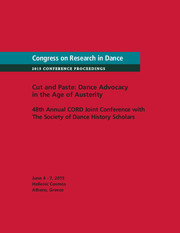Article contents
The Economy of West African Dance in Italy
Published online by Cambridge University Press: 23 September 2014
Abstract
Over the past decade, so-called African dance has become increasingly popular in Italy, growing in tandem with local West African diasporic communities and the national concern over immigration. Although the circulation of African dance provides West African migrants with an important form of self-identification and subsistence, it often revolves around problematic discourses rooted on the myth and romance with the primitive. Constructing and capitalizing on the fetishization of black bodies, African dance mobilizes complex economies of desire that rest on an orientalist fascination with the Other. While these economies reify racist stereotypes, they also enable significant communities of knowledge and interracial encounters.
- Type
- Research Article
- Information
- Copyright
- Copyright © Claudia Brazzale 2013
References
Works Cited
- 1
- Cited by


